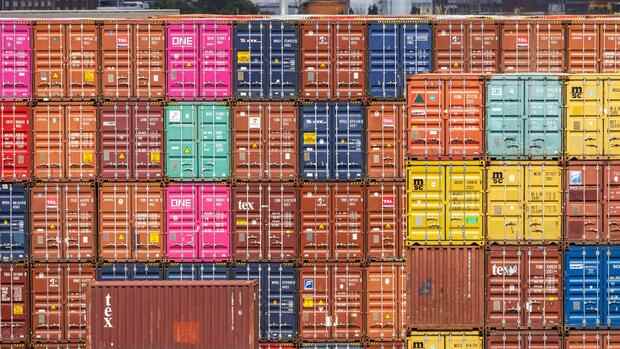The spread of the corona variant Omikron remains a risk for the economy.
(Photo: imago images/Arnulf Hettrich)
Berlin With 2.7 percent growth, the German economy reported back in 2021 after the Corona low. However, the growth in gross domestic product (GDP) reported by the Federal Statistical Office on Friday based on the first figures was lower than long hoped for.
This is also due to the fact that the German economy shrank in the fourth quarter of 2021 according to an initial estimate: According to the information available so far, the gross domestic product has decreased compared to the previous quarter, the Federal Statistical Office announced on Friday in Wiesbaden. According to the latest data, economic output in Germany fell by 4.6 percent in 2020 as a result of the pandemic.
The coronavirus, which is still rampant, including renewed restrictions in retail, for example, and global delivery bottlenecks are slowing down Europe’s largest economy. Economic research institutes have lowered their forecasts for this year in a row over the past few weeks.
Economists now assume that the economy will not really pick up again until spring 2022. According to the latest forecasts, the German economy should still grow between 3.5 percent and a good four percent in the current year, despite the somewhat gloomier outlook. That would then be on a scale similar to that of the years following the deep recession of 2009 as a result of the global financial and economic crisis.
Top jobs of the day
Find the best jobs now and
be notified by email.
According to economists, the main driver will be private consumption. Many households are sitting on high savings because, for example, trips had to be canceled due to the pandemic and leisure activities were sometimes only possible to a limited extent.
Economists also assume that companies will invest more again from spring, when there is less uncertainty about the further course of the corona pandemic. On the other hand, exports, which are also an important driver of the German economy, are likely to continue to suffer from logistics problems and delivery bottlenecks for raw materials and intermediate products in the coming months.
The burdens of the crisis will continue to weigh on Germany for a while. According to preliminary calculations by the Federal Statistical Office, the German state spent significantly more money than it received in the second year of the pandemic.
In relation to the total economic output, the deficit of the federal, state, local and social security funds was 4.3 percent in 2021. In 2020, Germany also had to record a budget deficit of 4.3 percent for the first time since 2011.
Germany is therefore not threatened with trouble from Brussels. Because of the corona crisis, the EU countries had suspended the rules of the Stability and Growth Pact for the first time, according to which the budget deficit must not exceed three percent and total debt must not exceed 60 percent of gross domestic product. The pact should take effect again in 2023. In order to cushion the economic consequences of the pandemic, the EU countries had to take on enormous debt.
More: This is how the German economy will develop
